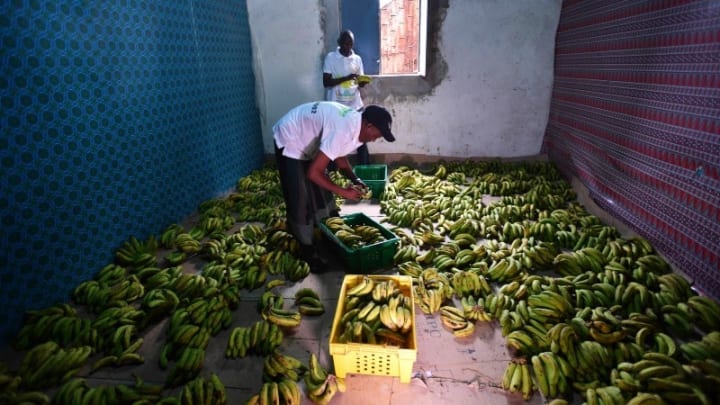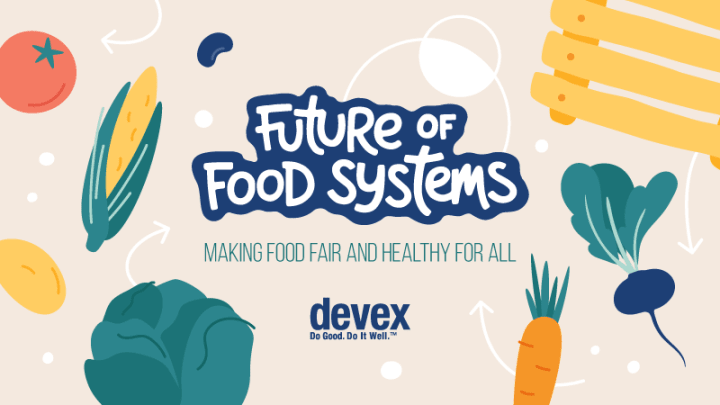
Long before the emergence of COVID-19, it was well-accepted that the world was off-course to achieve most of the Sustainable Development Goals by 2030, including ending hunger. But recovering from the pandemic to deliver any of the 17 SDGs relies now more than ever on first feeding the world.
Yet as COVID-19 spread, the reported number of hungry people rocketed upward after three decades of progress, with worse still likely to come in some regions as farmers contend with an unprecedented number of extreme weather events as well as the impact of the pandemic.
There is no denying that current food and agricultural market systems and power dynamics have not worked for all countries and all communities, particularly the most marginalized and vulnerable.
Part of our The Future of Food Systems series
Find out how we can make food fair and healthy for all. Join the conversation using the hashtag #FoodSystems and visit our The Future of Food Systems page for more coverage.
But before the world can transform food systems to better provide for a growing population facing new and emerging challenges, countries, governments, and the public must also transform the way they engage with and think about entire food systems.
Not only does the planet need improved policies, markets, and processes, it also needs new mechanisms for developing this reimagined system, from the first seed to the last spoonful.
There is no single group responsible for transforming food systems to be more inclusive, nutritious, sustainable, and resilient. The responsibility for a functioning food system is shared between public and private sectors, companies and consumers, authorities and individuals, which is why it can only be transformed by sharing platforms, ideas, and learnings on a global level like never before.
Success stories during the pandemic have offered hope for what can be achieved when people around the world are enabled and encouraged to join forces for good.
In the past year, the world has crowdsourced meals for hungry and vulnerable families, watched young climate campaigners hold their own “mock” COP 26 talks, and awarded the United Nations’ humanitarian food aid program the Nobel Peace Prize.
These precious highlights offer lessons for transforming food systems in what is a “make or break” year, and the UN Food Systems Summit must make full use of them.
The whole world can benefit from talking and listening to one another to share experiences of every stage of the food system.
—A crucial first step was last year’s 24-hour conversation online where smallholder farmers, Indigenous people, and students were given the opportunity to engage on the same platform as world leaders, policymakers, and researchers to share ideas on what is working in their food systems and what needs to improve.
Democratizing the discussion about food systems is vital because people do not eat ideas and policies, they eat food grown and delivered by other people, who work in fields, in factories, in research labs, in distribution centers, in shops, and in restaurants. It is all of these people who have the knowledge, insights, and understanding to help improve the system at large and make it more inclusive, more sustainable, and more resilient.
But we must keep up this momentum to expand the conversation to involve everyone with a stake in food systems until we arrive at the solutions that will end hunger and malnutrition, protect the environment, and increase equity.
This is why we are also hosting the Food Systems Summit Dialogues, to provide structured opportunities for conversations at every level, from U.N. member states to the individual.
We are not starting from scratch — we already know many of the problems afflicting our food systems. And there are existing policy solutions such as the Committee on World Food Security’s “Principles for Responsible Investment in Agriculture and Food Systems,” and the European Union’s "Farm to Fork" strategy, which lay solid foundations.
Opinion: The future of food must include a commitment to human rights
Michael Fakhri, U.N. special rapporteur on the right to food, explores why the U.N. Food Systems Summit needs a rethink.
But the whole world can benefit from talking and listening to one another to share experiences of every stage of the food system.
The summit has also gathered a network of Food Systems Champions and Heroes to advocate not only for better food systems but for better and greater engagement from everyone.
One of the most damaged aspects of our food system is trust in each other. Governments, companies, and communities need to improve this if we are to improve our food systems in new ways.
So, in 2021, I hope to see governments working more closely with the private sector and taking on recommendations on how to manage trade-offs, including repurposing agricultural subsidies toward producing healthier and more sustainable food.
Retailers and consumers also have a responsibility to reduce food waste, and civil society can be an engine of engagement better to drive progress.
The only consensus we need is that food systems must adapt to overcome the challenges they face around the world. I am yet to meet one person who disagrees; in fact, the level of agreement on the need for change is rarely so closely aligned.
But let’s not kid ourselves. Achieving action with the right level of ambition and with sufficient scale will need “no-regret” investments, shared costs of trade-offs, and reduced waste in all forms. Most of all, it will need the collective will and engagement of billions, not millions.
So, as we all reflect on the year just passed, now is the time to come forward with ideas and ways to improve food systems, to support the pandemic recovery but also to get the world back on track for a better future for all.
To make this decade better for everyone, we all need to engage: in dialogues, in priority areas, and in networks across food systems.
Visit the Future of Food Systems series for more coverage on food and nutrition — and importantly, how we can make food fair and healthy for all. You can join the conversation using the hashtag #FoodSystems.





